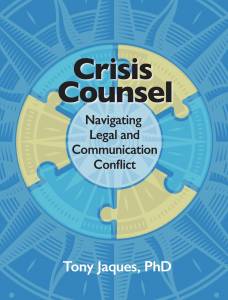Should legal advice take precedence in a crisis?
by Tony Jaques, Director of Issue Outcomes Pty Ltd, for people who work in issue and crisis management
Lawyers are involved in just about every serious organizational crisis. Yet how much specific training do they receive about their role in a crisis as part of a cross-functional response team? And how should they work with communicators and designated crisis managers?
The idea of lawyers taking the lead in a crisis and reputation management is gradually emerging, mainly among lawyers themselves.
For example, a recent article in the Association of Corporate Counsel Docket argued that Chief Legal Officers are “uniquely positioned within the organization” to lead the effort when reputation is at risk.
A report in Global Legal Post in December argued the General Counsel role had “evolved to include crisis leadership,” with GCs expected to protect their company’s reputation and minimize disruption.
And the Financial Times in September featured the headline “How general counsel became the corporate ‘voice of conscience’.”
Turning specifically to crisis management, a similar sentiment was revealed in the findings of my research in partnership with SenateSHJ and its PROI overseas network. Experienced crisis lawyers in Australia, New Zealand, UK, Canada, and the US were interviewed, and a majority said it is lawyers who should take the lead in a crisis (click here for the full report).
However, independent legal experts and proficient crisis managers tend to agree it’s often best if the lawyer is not in charge.
For example, the late Washington DC-based attorney and crisis authority Richard Levick believed it came down to the question: Who’s driving the bus? “Legal counsel in a crisis is essential and needs to be on the bus,” he wrote. “But unless legal exposure is the single greatest market cost, it shouldn’t be driving the bus.”
Professor Daniel Diermeier, formerly of the Kellogg School of Business at Northwestern University, is unequivocal about the topic: “Good crisis management teams have a strong, opinionated General Counsel, while poor crisis management teams are run by the General Counsel.”
A few years ago PR Daily put it even more bluntly with the headline: “Why your lawyers can make your crisis worse.”
But none of this helps lawyers and communicators work better together when a crisis strikes.
My new e-book – Ten Things Law School Doesn’t Teach About Crisis Management – aims to help strengthen that working relationship (send your name and email to [email protected] for a free copy).
It addresses some of the principles underlying effective crisis response:
- What’s legal isn’t always what’s best
- Apologizing is not kryptonite for lawyers
- Perception IS reality
- Legal counsel should sometimes be ignored.
I use new and classic case studies to illustrate some of the core challenges between the professions. I also highlight that lawyers and communicators work for the same organization and are in the same business — communication — though they do it for different reasons and typically communicate with different audiences. Most importantly, they both believe they are acting in the best interests of the client.
The truth is that lawyers and communicators need each other. They have no option but to cooperate if crises are to be effectively managed and the client’s reputation protected as far as possible.
One recent commentator wrote a hopeful piece titled: “Cats Sleeping With Dogs: How Lawyers and Crisis Communicators Can Work Together”. He was right . . . but it takes real effort on all sides.
For your free copy of Ten Things Law School Doesn’t Teach About Crisis Management, send your name and email to [email protected].
+++++++++++++++++++++++++++++++++++
A Parting Thought
“Some people don’t like lawyers, that is, until they need them.”
Kenneth Eade (Predatory Kill)
+++++++++++++++++++++++++++++++++++
Tony Jaques is Director of Issue Outcomes Pty Ltd, for people who work in issue and crisis management
Learn more about Reputation Risk, CEO apologies, and Crisis communication in Tony Jaques’ new book, Crisis Counsel: Navigating Legal and Communication Conflict.
CLICK HERE TO DOWNLOAD A FREE CHAPTER!
“Crisis Counsel confirms Tony Jacques’ position as one of the industry’s foremost experts on issues and crisis management. In addressing the complex interactions between legal and communication crisis responses, Dr. Jacques provides riveting case studies and practical advice. It highlights the financial and reputation risks of not effectively integrating communications and legal counsel. It should be on every communications practitioner’s reading list, and companies should insist their in-house and external legal counselors read it.” – Noel Turnbull, Former Chair of Turnbull Porter Novelli, Adjunct Professor, RMIT University.
“For senior managers who find themselves in the C-suite for the first time,Crisis Counselshould be mandatory reading. Such specific legal and communications provocations are not covered in university management courses, and the introduction is replete with illuminating case studies and key takeaways. The author provides sage advice for Chief Executives who must ultimately make a decision based on what they think is the right thing to do; often under pressure. Crisis team leaders and team members will find this book equally of value, as the more you know about it, the better you and the team will be.” – Jim Truscott, Director, Jim Truscott & Associates Pty Ltd, Perth, Australia
“For far too long, the role of lawyers in crisis management has been neglected. If discussed at all, it is often in negative terms. Tony Jaques adjusts this picture in masterly yet eminently readable terms. His comprehensive discussion of apology in crisis management is likely to be a go-to source for years to come. This is a welcome book for anyone interested in how crisis-confronted corporations (and other organizations, too) can navigate the tricky legal waters of communicating under fire. For university teachers like me, it’s a rich source of well-researched case studies. A gem!” – Chris Galloway, Ph.D., Head of Public Relations, Massey University of New Zealand

